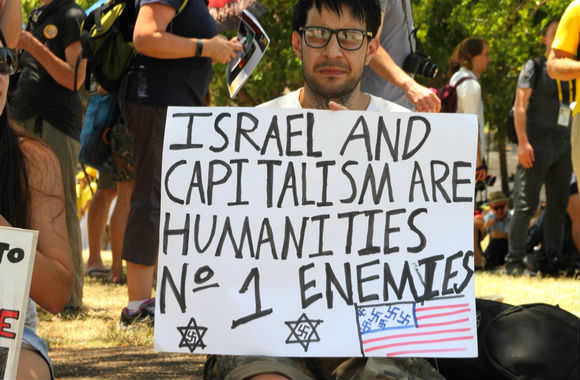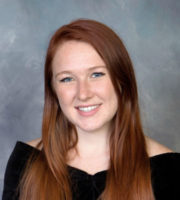
Whose speech is being suppressed?
Israel-related anti-Semitism is far more likely to show “intent to harm” Jewish students than “classic” anti-Semitism that simply targets students for their Jewish identity, according to a new report on 2017 incidents of campus anti-Semitism.
The harassing behavior has a strong element of censorship and chilling effects, the AMCHA Initiative wrote in an email Wednesday debuting its annual report.
“Suppressing speech and ostracizing and excluding Jewish and pro-Israel students from typical campus life were the most common features of Israel-related anti-Semitic incidents,” said the pro-Israel nonprofit, which aims to track and combat campus anti-Semitism.
Anti-Israel activism that targets pro-Israel speech is a recurring feature of group’s research. Its midyear 2016 report found that suppression of Jewish students’ speech had nearly doubled from a year earlier, for example.
But critics of pro-Israel groups claim it’s the latter who are trying to stifle speech that criticizes Israel but is protected by the First Amendment.
The same day the AMCHA Initiative released its report, a group that defends pro-Palestine activists called on Congress to reject a bill that would allegedly encourage the government and campus officials to investigate anti-Israel speech.
The bill would require the Department of Education to consider the State Department’s controversial definition of anti-Semitism when assessing “whether a practice was motivated by anti-Semitic intent.”
Pro-Israel advocates have often asked colleges to adopt the State Department’s definition, which includes the “demonization or delegitimization of Israel” as anti-Semitic.
MORE: Suppression of Jewish student speech nearly doubles in a year
Today Palestine Legal and a coalition of civil and human rights orgs call on Congress to reject an unconstitutional bill aimed at censoring Palestine advocacy on college campuses. https://t.co/Or9gk5z0KK
— Palestine Legal (@pal_legal) August 8, 2018
No campus sympathy for ‘anti-Zionist harassment’
The initiative counted three times as many reported incidents of classic anti-Semitism (205) as Israel-related incidents (71) on campus last year. But less than a quarter of the former were deemed to have intent to harm students, compared to 94 percent of the latter.
AMCHA’s email says its researchers developed a “new index” to distinguish between incidents that show intent to harm, such as “physical attacks,” property destruction and speech suppression, and the simple expression of “bigoted beliefs.”
It also looked at the number of people who carried out each incident and their group affiliations, if any, because group harassment “enhances the emotional stress of its victims.”
Not all the incidents meet the Department of Education’s definition of a “hostile environment,” which is harassment “sufficiently serious to deny or limit” a student’s participation in an educational program, the report makes clear. But AMCHA does categorize “credible threats to the safety and well-being of Jews in general,” even if they don’t clearly target a person or group, as showing “intent to harm.”
The findings show an “emergent and growing strategy” to boycott students as well as Israel, AMCHA’s email says. Incidents from 2015 to the first half of 2018 show that Israel-related incidents have become “significantly more flagrant,” with a focus on “harming pro-Israel members of the campus community.”
Anti-Israel groups are emboldened to target pro-Israel peers because university administrators see “anti-Zionist harassment” as politically motivated, rather than “unlawful discrimination.” Other members of the community are “sympathetic” to Jewish students in response to classic anti-Semitism but not anti-Zionist harassment, AMCHA said.
The study looked deeper than previous research, which has “given equal weight” to all anti-Semitic incidents, “to better understand how anti-Semitism affects American campuses today,” the group’s email said.
MORE: Columbia students shout down Israel’s ambassador to UN

Attempts to ostracize, exclude are on track to pass last year
“Genocidal expression” such as swastika display is the most common feature of classic anti-Semitism, and while little of it showed intent to harm, those harm incidents have stayed roughly constant in the 20s each year, the report says.
Speech suppression (44 percent) and ostracization (76 percent), meanwhile, are the dominant features of Israel-related incidents from 2017.
Silencing attempts have stayed “relatively constant” for the past three years, all hovering around 30 per year and 21 so far in 2018 – the same as this point in 2017. But attempts to ostracize and exclude pro-Israel students and staff from campus life jumped from 25 in 2015 to 54 last year, and that figure is on pace to be broken in 2018, the report says.
The first half of 2018 has already outpaced 2017 for the number of “open calls for the boycott or expulsion” of students or pro-Israel groups. Incidents jumped from 4 in 2016 to 14 in 2017 and 18 already this year.
Some specific silencing incidents in the report include disrupting a Columbia University event with Israeli Ambassador Danny Danon and blocking the auditorium entrance; a pro-Palestine group boycott of “IsraelFest” at the University of Maryland (preceded in 2016 at the University of California-Irvine); and two vandalisms of a “pro-peace mural” at UC-Santa Barbara.
Personal or group targeting incidents include a student-made “Disorientation Guide” at Tufts University that said Jewish student group Hillel supports a “white supremacist state”; San Francisco State pro-Palestine students blocking Hillel from a “Know Your Rights” event; and similar activists demanding the removal of a “Christian Zionist” alum from a St. Olaf College advisory board.
MORE: Tufts students say Hillel supports ‘white supremacist state’

Group that compared Jewish Trump official to white supremacists is mad
AMCHA’s report drew little reaction that The College Fix could find Wednesday.
More pressing for Israel critics and pro-Palestine groups is consideration of the Anti-Semitism Awareness Act, which is pending in both houses of Congress and has bipartisan cosponsorship.
The State Department’s “non-legally binding” definition of anti-Semitism, which the bill would have the Department of Education use in civil-rights investigations, gives examples including “claiming that the existence of a State of Israel is a racist endeavor” and comparing “contemporary Israeli policy to that of the Nazis.”
A group that defends the civil and constitutional rights of pro-Palestine students, Palestine Legal, joined with other groups in a letter Tuesday to ask House Judiciary Committee leaders to “reject this unconstitutional bill, as you did in 2016.”
They said it was “especially detrimental to universities, whose missions necessitate respect for freedom of speech, critical inquiry, and unfettered debate,” and noted the author of the definition, Kenneth Stern, has said it shouldn’t be used on college campuses.
The bill invites the Department of Education and universities to pick and choose approved viewpoints and chill “one side of an important political debate,” said the letter, also signed by the National Lawyers Guild, Jewish Voice for Peace and Council on American-Islamic Relations, among others.
The State Department definition has been used by groups including the Brandeis Center “to silence students, faculty, and staff who speak critically of Israeli violations of Palestinian rights,” the letter says.
When the Brandeis Center’s founder Kenneth Marcus was confirmed as the Trump administration’s education civil-rights leader in June, Palestine Legal compared him to “white supremacist, anti-Muslim and anti-Palestinian ideologues.”
In a press release Wednesday, Palestine Legal said the bill was aimed at “censoring Palestine advocacy on college campuses.” It said the State Department definition is “widely-criticized and overbroad” and would add “no new legal protections for Jewish students.”
A similar version of the bill failed to pass the House in 2016 after swiftly passing the Senate. It was also targeted by Palestine Legal and similar groups.
MORE: Palestine Legal compares Marcus to white supremacist
IMAGE: Alleksander/Shutterstock, paintings/Shutterstock, Khairul Effendi/Shutterstock
Like The College Fix on Facebook / Follow us on Twitter






Please join the conversation about our stories on Facebook, Twitter, Instagram, Reddit, MeWe, Rumble, Gab, Minds and Gettr.